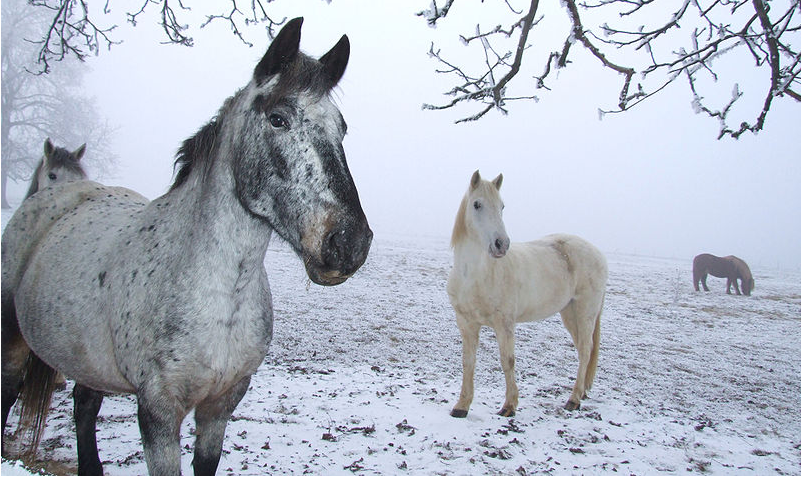Here's how to prevent it. The incidence of colic in horses rises dramatically in winter. The most common type of winter colic in horses is impaction colic. Undigested food gets "stuck" in the digestive track, which can be life threatening.
Why does the risk of colic rise in winter? The most frequent cause is lack of access to (reasonable temperature) water. Water tanks freeze, so pastured horses can end up going for long periods without access to water. Water buckets in stalls can freeze as well, or the water can become so uncomfortably cold that horses will avoid drinking. Freezing weather can also cause pipes to freeze in unheated barns, which can shut off water to indoor waterers without barn owners knowing there's a problem. PREVENTION IN THE KEY 1. Check your water tanks, buckets, and plumbing several times a day. If the tank or bucket has frozen over, break up the ice, or you can use an automatic de-icer like this one. 2. If possible, add hot water to tanks and buckets in order to bring the water in them to room temperature, at least for a while. Horses will usually drink right away once the water is warmed up. 3. Consider using heated water buckets, like this one, or this one. Or install automatic heated livestock waterers to your pasture or stalls. Your horses will have access to room temperature water 24/7. 4. Be sure to feed your horse high quality forage (hay) plus horse feed that supplies vital nutrients (such as selenium and Vitamin E.) Feed at least twice daily, not one huge meal. And NEVER grain your horse before riding. 5. Give your horse daily turnout for several hours to help food move through their digestive system as they walk around. Some other tips: For horses that are prone to colic, consider adding quality fats to their diet, such as rice bran oil or flax oil. Horses who graze in sandy soil areas may benefit from psyllium, a nondigestible fiber that clears matter from the intestine. Here is a good psyllium product from Farnam. Adding probiotics and prebiotics to their diet improved hind gut function, which also helps protect against colic. Here is a good product that supplies both. You might also be interested in SmartPakEquine's ColiCare program. According to the SmartPakEquine website, if you feed your horse one of their digestive supplements, you may be eligible for $15,000 of colic surgery reimbursement through their ColiCare program. Happy Riding! Copyright Dec 10, 2019 Denise Cummins; updated May 31, 2024 The Thinking Equestrian
0 Comments
Your comment will be posted after it is approved.
Leave a Reply. |
AuthorDenise Cummins, PhD, has 30+ years experience training horses and giving instruction in dressage and jumping, and running a successful horse business. ArchivesCategories |

 RSS Feed
RSS Feed
